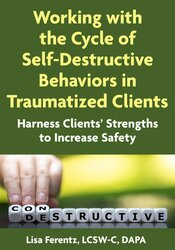
×

Clients with histories of prior trauma often lack the ability to engage in appropriate affect regulation, so they may find coping and self-soothing through self-destructive strategies including acts of self-mutilation, addictions, and disordered eating. Join Lisa Ferentz, LCSW-C, DAPA, an esteemed expert in the strengths-based, de-pathologized treatment of trauma, to learn:
All members of the PESI, Inc. planning committee have provided disclosures of financial relationships with ineligible organizations and any relevant non-financial relationships prior to planning content for this activity. None of the committee members had relevant financial relationships with ineligible companies or other potentially biasing relationships to disclose to learners. For speaker disclosures, please see the faculty biography.
NOTE: Tuition includes one free CE Certificate (participant will be able to print the certificate of completion after passing the online post-test (80% passing score) and completing the evaluation). Instructional methods will include PowerPoint, didactic lecture, and others.
Continuing Education Information: Listed below are the continuing education credit(s) currently available for this non-interactive self-study package. Program content is reviewed periodically per accrediting board rules for currency and appropriateness for credit. Credit approvals are subject to change. Please note, your licensing board dictates whether self-study is an acceptable form of continuing education, as well as which credit types are acceptable for continuing education hours. Please refer to your licensing board's rules and regulations. If your profession is not listed, please contact your licensing board to determine your continuing education requirements and check for reciprocal approval.
For other credit inquiries not specified below, please contact info@pesi.com or 800-844-8260 before purchase.
Materials that are included in this course may include interventions and modalities that are beyond the authorized practice of your profession. As a licensed professional, you are responsible for reviewing the scope of practice, including activities that are defined in law as beyond the boundaries of practice in accordance with and in compliance with your profession's standards.
For Planning Committee disclosures, please see the statement above. For speaker disclosures, please see the faculty biography.
Earn up to 5.0 CE hours. Please see below, for more details, as credit amounts vary by jurisdiction and profession.
PESI, Inc. is approved by the Canadian Counselling and Psychotherapy Association to offer continuing education for counsellors and psychotherapists. PESI, Inc. maintains responsibility for the program. This self-study activity is approved for 5.0 credit hours.

PESI, Inc., #1062, is approved as an ACE provider to offer social work continuing education by the Association of Social Work Boards (ASWB) Approved Continuing Education (ACE) program. Regulatory boards are the final authority on courses accepted for continuing education credit. ACE provider approval period: January 27, 2023 - January 27, 2026. Social workers completing this course receive 5.0 Clinical continuing education credits.
Course Level: Intermediate Format: Recorded asynchronous distance. Full attendance is required; no partial credits will be offered for partial attendance.
Canadian Social Workers: Canadian provinces may accept activities approved by the ASWB for ongoing professional development.
PESI, Inc. is approved by the Canadian Psychological Association to offer continuing education for psychologists. PESI, Inc. maintains responsibility for the program. This program is approved for 5.0 self-study continuing education hours. Full credit statement at: www.pesi.com/cpa-statement
This self-study activity qualifies for 5.0 continuing education clock hours as required by many national, state and local licensing boards and professional organizations. Save your activity advertisement and certificate of completion, and contact your own board or organization for specific requirements.
| File type | File name | Number of pages | |
|---|---|---|---|
| Manual - Working with the Cycle of Self-Destructive Behaviors in Traumatized Clients: Harness Clients' Strengths to Increase Safety (1.1 MB) | 42 Pages | Available after Purchase | |
| Manual - Working with the Cycle of Self-Destructive Behaviors in Traumatized Clients: Harness Clients' Strengths to Increase Safety - French (1.1 MB) | 42 Pages | Available after Purchase | |
| Manual - Working with the Cycle of Self-Destructive Behaviors in Traumatized Clients: Harness Clients' Strengths to Increase Safety - French (1.1 MB) | 42 Pages | Available after Purchase | |
| Manual - Working with the Cycle of Self-Destructive Behaviors in Traumatized Clients: Harness Clients' Strengths to Increase Safety - Italian (1.1 MB) | 42 Pages | Available after Purchase | |
| Manual - Working with the Cycle of Self-Destructive Behaviors in Traumatized Clients: Harness Clients' Strengths to Increase Safety - Italian (1.1 MB) | 42 Pages | Available after Purchase |

Lisa Ferentz, LCSW-C, DAPA, is a recognized expert in the strengths-based, de-pathologized treatment of trauma and has been in private practice for over 35 years. She presents workshops and keynote addresses nationally and internationally, and is a clinical consultant to practitioners and mental health agencies in the United States, Canada, the UK, and Ireland.
She has been an adjunct faculty member at several universities, and is the founder of “The Ferentz Institute,” now in its 12th year of providing continuing education to mental health professionals and graduating over 1,600 clinicians from her two certificate programs in Advanced Trauma Treatment.
In 2009, she was voted the “Social Worker of Year” by the Maryland Society for Clinical Social Work. Lisa is the author of Treating Self-Destructive Behaviors in Trauma Survivors: A Clinician’s Guide, 2nd Edition (Routledge, 2014), Letting Go of Self-Destructive Behaviors: A Workbook of Hope and Healing (Routledge, 2014), and Finding Your Ruby Slippers: Transformative Life Lessons From the Therapist’s Couch (PESI, 2017). Lisa also hosted a weekly radio talk show, writes blogs and articles for websites on self-harm and self-care, and teaches on many webinars.
Speaker Disclosures:
Access never expires for this product.
Visit our FAQ page at https://www.pesicanada.com/faq or contact us at https://www.pesicanada.com/contact-us
Attachment, Affect Regulation, and Psychological Development in a Traumatic Environment
Strengths-Based Assessment and Treatment of Self-Destructive Behaviors
Additional Clinical and Other Considerations
Satisfaction Guarantee
Your satisfaction is our goal and our guarantee. Concerns should be addressed to info@pesicanada.com.
Please wait ...